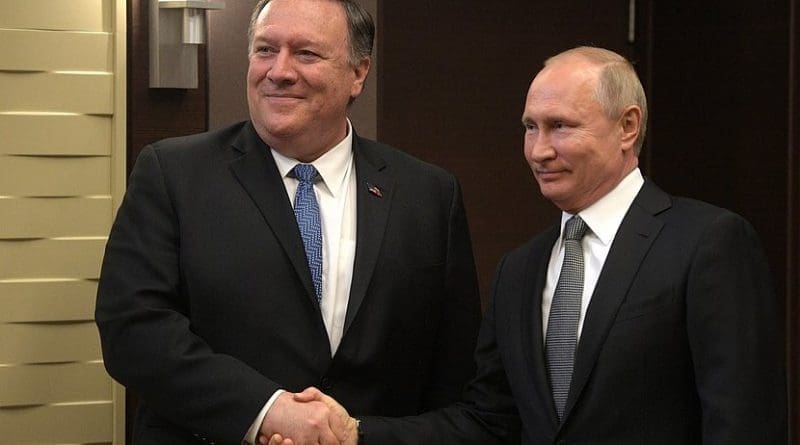Putin Tells Pompeo He Hopes To ‘Fully Restore’ US Ties
By RFE RL
(RFE/RL) — U.S. Secretary of State Mike Pompeo warned Russia against interference in next year’s U.S. presidential election, as Russia’s foreign minister likened Washington’s push for a new government in Venezuela to the U.S. war in Iraq.
Тhe comments by Pompeo and Sergei Lavrov came at a joint news conference on May 14 in the Black Sea city of Sochi as the two sought to rebuild bilateral relations that have been badly eroded by U.S. assertions of Russian election meddling, the conflict in Ukraine, Syria, Venezuela, and other matters.
U.S. President Donald Trump has renewed his effort to build a rapport with Moscow, now that the investigation of Special Counsel Robert Mueller has concluded.
Trump discussed the investigation with Russian President Vladimir Putin in a phone call earlier this month. On May 13, he told reporters at the White House that he intended to meet Putin at the Group of 20 summit in Japan next month.
Putin, who met with Pompeo after the news conference, said he hoped to “fully restore” ties between Moscow and Washington, and said he thought that Trump genuinely wanted to do the same.
Putin also praised Mueller’s probe, which did not find evidence that Trump or his associates sought to conspire with Russian officials to sway the 2016 U.S. election, but also stopped short of clearing Trump of allegations he obstructed Mueller’s work.
Putin called it “quite an objective investigation.”
“We’ve said many times that we also want to fully restore our relations. I hope that the necessary conditions for that to happen will now be created,” Putin said.
The Kremlin later said Putin would be open to a new meeting with Trump if a formal proposal is made.
Yuri Ushakov also said Putin’s meeting with Pompeo had not yielded any breakthrough, but had been held in a business-like atmosphere.
At the news conference, which was held after some three hours of talks, Lavrov said Moscow was open to a Trump-Putin meeting, but did not confirm one was planned, echoing earlier remarks from a Kremlin spokesman.
Both countries needed to dispel “suspicions and prejudices” and to “start building a new constructive framework,” Lavrov said.
Pompeo said he warned Russia not to interfere in the 2020 U.S. presidential election — something that U.S. authorities have said was possible – and he said Moscow needed to demonstrate it had halted such efforts.
If Russia interfered, “it would put our relationship in an even worse place than it has been,” Pompeo said.
Lavrov, meanwhile, accused the United States of funding Russian nongovernmental organizations, with the intent of interfering in Russia’s elections.
On Venezuela, the two diplomats’ comments showed Moscow and Washington’s divergent interests in the country.
The Trump administration has called on President Nicholas Maduro to leave, while Moscow, which has substantial oil and weapons investments there, has dismissed Washington’s calls, and even reportedly sent private mercenaries to Caracas.
Maduro has “brought nothing but misery to the Venezuelan people. We hope that Russia’s support for Maduro will end,” Pompeo said.
Lavrov, meanwhile, likened the U.S. push in Venezuela to the U.S. war in Iraq, and what happened in Libya when Washington and European allies helped topple Muammar Qaddafi in 2011.
“Threats by the U.S. administration have nothing to do with democracy,” Lavrov said.
Ahead of his meeting with Pompeo, Russian state TV broadcast a visit by Putin to a military flight test center in southern Russia, where he inspected a new nuclear-capable “hypersonic” missile.
Asked by reporters whether the timing of Putin’s tour, ahead of his meeting was Pompeo, was intentional, Kremlin spokesman Dmitry Peskov dimissed that.
“There’s no need to come up with any conspiracy theories here,” he was quoted as saying.
Prior to Pompeo’s departure, the U.S. State Department said the main agenda included not just Venezuela, and the conflicts in Ukraine and Syria, but also arms control treaties.
“The starting point we have to have when we discuss our policy toward Russia…is to acknowledge frankly that Russia has taken a series of aggressive and destabilizing actions on the global stage,” a senior State Department official told reporters on May 10.
The official, who spoke on condition of anonymity, added that Pompeo’s trip was “an opportunity to make those points clear to the Russian government and what our expectations are and [to] see how to forge a path forward.”
In February, the United States suspended participation in the 1987 Intermediate-Range Nuclear Forces (INF) Treaty because of what it says is Russia’s development and deployment of a missile system that violates the pact.
Moscow, which denies the accusation, later followed suit.
Moscow and Washington have also been gearing up for talks on how and whether to extend the New START treaty, the only U.S.-Russia arms control pact limiting deployed strategic nuclear weapons.
It is set to expire in February 2021 but can be extended for five years if both sides agree.

